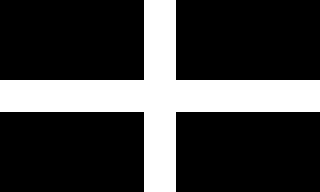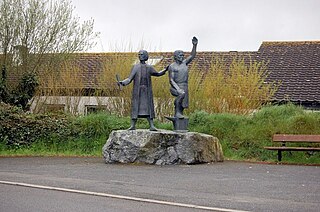Cornish devolution
Political movement in Cornwall, England From Wikipedia, the free encyclopedia
Cornish devolution is the movement to increase the governing powers of the County of Cornwall.[1]

History of Cornish devolution and status
Summarize
Perspective
Origin of English rule
By the end of King Ine's reign (688–726), the West Saxon frontier had probably reached the modern western border of Devon. Anglo-Saxon expansion into Cornwall may have begun under King Ecgberht (802–839), although the Cornish had their own king as late as 875, when Dungarth rex Cerniu is said to have drowned. Some level of Cornish independence may have continued into the 10th century, consistent with William of Malmesbury's account of King Æthelstan's expulsion of the Britons from Exeter and establishment of the River Tamar as the boundary between Cornwall and Wessex.[2]
In 1066, much of Cornwall was invaded by the Normans,[3] and Brian of Brittany may have been made earl of Cornwall by William the Conqueror and some Cornish people returned to Cornwall from Brittany following prior invasion by the Anglo-Saxons.[4]
The peerage of the Earl of Cornwall was created and first appointed to Condor of Cornwall, a survivor of the royal lineage of Cornwall.[5]
Duchy of Cornwall


The Duchy of Cornwall was formed in 1337 by English king Edward III for his first born son, Prince Edward, and a charter stated this would continue in the same manner for each eldest son of the English monarch. The Duke of Cornwall is the title given to the holder of the Duchy of Cornwall, and the Duke holds some rights in Cornwall and owns the coastline and riverbeds around Cornwall as well as the significant profits from which are produced. These profits contribute to financial support of the English Duke of Cornwall.[6]
Cornish rebellion and Stannary Parliament
In 1497, Michael Joseph An Gof and Thomas Flamank and a Cornish army marched upon London in protest of raised taxes by Henry VII who aimed to increase funding for a war against the Scots. The Cornish army was defeated and An Gof and Flamank were both executed. However, the rebellion may have influenced the decision by the Henry VII to introduce the Charter of Pardon in 1508 which gave powers to the Convocation of the Tinners of Cornwall (commonly known as the Stannary Parliaments) to veto English legislation in Cornwall.[5]
Local Government Act 1888
The Local Government Act 1888 established Cornwall as an administrative county and established Cornwall County Council.[7]
Modern Devolution Proposals
Summarize
Perspective
Early 2000's call for devolution powers from business
Managing director of Ginsters Mark Duddridge has outlined what he believes to be key reasons that Cornwall would benefit from increased devolution powers citing:
- expertise in handling public money at a large scale in Cornwall
- good understanding and working relationship with local partners and good outcomes for investors (following the experience of the previous devolution)
- good local knowledge and success with the previous devolution
- the slow pace of working with national partners with the UK government & risk of losing investors
- tradition in Cornwall as an international trading area
- securing £14/15 million of investment in the space of two weeks due to good knowledge of business and investors
- the following businesses in Cornwall: emerging offshore wind business, geo-resources, geoscience, lithium business, database business, space business[8]
Early 2000's Proposed Cornish Assembly
The Cornish Constitutional Convention was formed in 2000 as a cross-party organisation including representatives from the private, public and voluntary sectors to campaign for the creation of a Cornish Assembly,[9] along the lines of the National Assembly for Wales, Northern Ireland Assembly and the Scottish Parliament. Between 5 March 2000 and December 2001, the campaign collected the signatures of 41,650 Cornish residents endorsing the call for a devolved assembly, along with 8,896 signatories from outside Cornwall. The resulting petition was presented to the Prime Minister, Tony Blair.[9]
Early 2020's Proposed Cornish Assembly
Cornish party Mebyon Kernow has called for the creation of a Cornish Assembly or parliament in light of the 2021 G7 summit in Cornwall, stating: "...what better legacy could there be than parity with the other Celtic parts of the UK, such as Scotland and Wales, in terms of influence and investment, and a comprehensive devolution deal, which would deliver a Cornish Assembly or Parliament?"[10]
2020's Annual All Under One Banner: St Piran's Day
Since 2021 an "All Under One Banner" march has occurred annually on 19 March in Cornwall to both celebrate St Piran's Day and promote greater autonomy for Cornwall and a greater discussion on its future.[11]
2021 Devolution report
A report by the Institute for Public Policy Research (IPPR), an independent think tank, suggested that Cornwall has "outgrown" the original devolution deal of 2015.
Sarah Longlands, director of IPPR North suggested that Cornwall needs "the power and resources to be able to get on and get the job done, rather than wait for central government to make the next move" and that based on their research "it is clear that Cornwall has made the best of the fairly limited decentralisation deal that it was originally offered." Longlands also suggested that due to the decline of the hospitality industry during the COVID-19 pandemic and "the uncertainty of Brexit, now is the time to give Cornwall real devolution which means that they have the economic powers and resources they need to support a strong and fair recovery.”[12]
2022 Council devolution ambitions
Cornwall Council has outlined several areas in which they are seeking devolution of powers from central government:
- The leader of Cornwall's council has called for devolution of second home tax powers to the Cornish Council, much like in Wales so that local residents are better able to afford local housing in their own communities.
- The council has ambitions for further devolution for Cornwall which includes further control over planning and taxation in order to better manage tourism in Cornwall.
- The council also wants devolution powers for a Cornish Freeport, including Newquay Airport and Falmouth docks.
- Control over the academic year, including being able to divide it into four terms.
- The ability to value properties for council tax.
- Investment in green technology.[13]
Cornish devolution to date
Summarize
Perspective
2015 Local authority devolution
In 2015 Cornwall became the first county of England to receive new devolved powers which included;
- Powers for Cornwall Council to franchise and improve bus services
- Health and Social care integration plan for Cornwall Council and Isles of Scilly Council
- Council selection of projects for multi-million-pound investment
- Cornwall and Isles of Scilly Local Enterprise Partnership (LEP) increased input for improving skills
- Streamlining LEP's abilities to integrate local and national services to strengthen companies in Cornwall.[1]
2016 Cornish language powers
In 2016 authority for the Cornish language (recognised under the Charter for Regional and Minority Languages in 2003) was transferred to Cornwall Council from the central government.[14]
2022 failed devolved power transfer and Meryon
In December 2022 at Spaceport Cornwall, Dehenna Davison the Parliamentary-Under Secretary of State for Levelling Up announced a package worth £360m transferring building and skills powers to Cornwall Council. The devolution deal required Cornwall to create a new directly elected regional Mayor (Meryon in Cornish).[15] The powers were designed to give the council and Mayor/Meryon "greater control over transport budgets, building, skills delivery, and greater influence with government to tackle challenges of second homes"[16][17][18]
The council announced in April 2023, it would be abandoning the proposed devolution deal and the role of a directly elected mayor due to public opposition. The council would instead look into a smaller devolution deal.[19][20]
2023 cross-party motion for Cornish Assembly
A cross-party motion led by Dick Cole and supported by a total of 27 councillors is set to go to a meeting of Cornwall Council in April 2023 and states, “Cornwall Council resolves to inform the UK Government that we wish to commence negotiations for a more meaningful devolution settlement similar to those enjoyed in the other Celtic parts of the UK (ie. a National Assembly of Cornwall or Cornish Parliament).
“Cornwall Council also resolves to request a meeting between the Secretary of State and a cross-party delegation from Cornwall Council as a matter of urgency.”[21] The motion failed to pass in the Cornish council with 38 to 36 councillors voting against the motion.[22]
2024 calls for a new Minister of Cornwall
In July of 2024 Linda Taylor and Lord Hutton called on the new Labour government to give Cornwall a Minister for Cornwall.[23]
2024 calls for a Cornish Assembly
On the 16 October 2024 Ben Maguire called on the government to give Cornwall a devolved Cornish Assembly, Labour MP Perran Moon also made a similar appeal for a deal akin to Wales.[24]
A motion and call led by Ben Maguire and supported by all other MPs in Cornwall alongside the Cornwall Council called on the government to start talks of a devolved Cornish Assembly and a Cornwall only deal.[25][26][27]
The 6 Cornish MPs discussed with Angela Rayner proposals for Cornish devolution, specifically opposing the Devon and Cornwall Combined Authority proposal on 18 December 2024.[28]
See also
Cornish related pages
Other major related movements
References
Wikiwand - on
Seamless Wikipedia browsing. On steroids.
